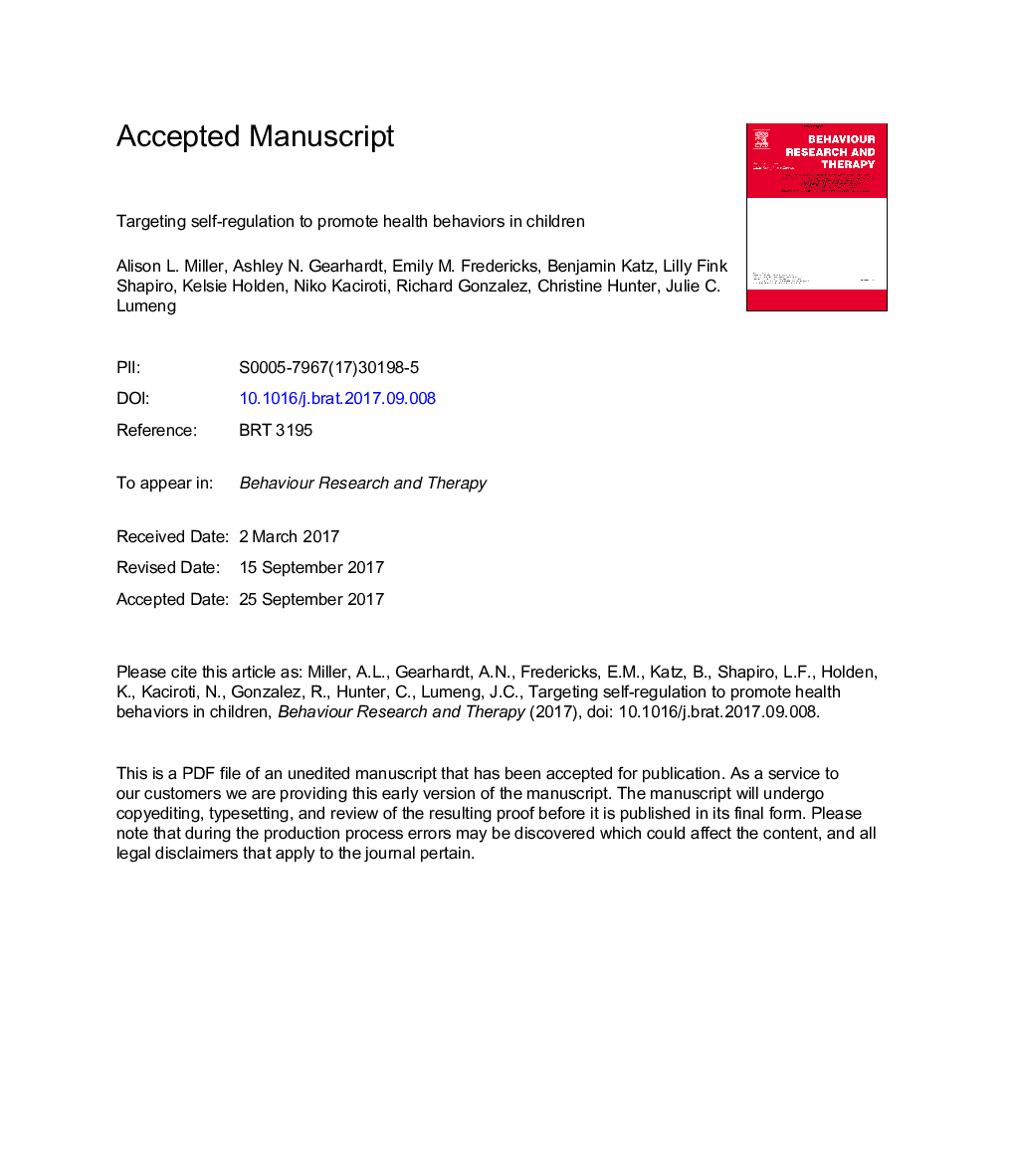| کد مقاله | کد نشریه | سال انتشار | مقاله انگلیسی | نسخه تمام متن |
|---|---|---|---|---|
| 7261910 | 1472748 | 2018 | 40 صفحه PDF | دانلود رایگان |
عنوان انگلیسی مقاله ISI
Targeting self-regulation to promote health behaviors in children
ترجمه فارسی عنوان
هدف گیری خود تنظیم برای ارتقاء رفتارهای بهداشتی در کودکان
دانلود مقاله + سفارش ترجمه
دانلود مقاله ISI انگلیسی
رایگان برای ایرانیان
کلمات کلیدی
ترجمه چکیده
خودکارآمدی ضعیف (به عنوان مثال، ناتوانی در استفاده از منابع شناختی، عاطفی، انگیزشی برای رسیدن به اهداف) فرضی است که به رفتارهای نامنظم در طول عمر کمک می کند. افزایش خودکارآمدی در اوایل ممکن است پیامدهای سلامتی مثبت را افزایش دهد. چاقی یکی از مهمترین مشکلات سلامت عمومی در پیشگیری از ابتلا به سرطان است. بنابراین یک مدل خوب برای درک خودکفایی و رفتار بهداشتی است. طول عمر یک گذار زمانی است که کودکان خودمختاری را در رفتارهای بهداشتی (مثلا غذا خوردن، عادت های ورزشی) افزایش می دهند که بسیاری از آنها شامل خود تنظیم است. این مقاله علمی علمی را برای بررسی مکانیسم های خود تنظیم می کند که فرضیه های مربوط به رفتارهای بهداشتی، به ویژه تغذیه آبوهوایی است که در کودکان مورد بررسی قرار نگرفته است. ما پروتکل های مداخله ی جدیدی را که برای افزایش مهارت های خودمراقبت، به ویژه عملکرد اجرایی، تنظیم احساسات، تفکر آینده گرا، و تعصب رویکرد طراحی شده اند، توصیف می کنیم. مداخلات از طریق بازدید از خانه تحویل داده می شود. تستهای خودارزیابی و رفتارهای تغذیه ای پرخطر با استفاده از وظایف رفتاری و گزارش های خود برای تعیین امکان سنجی و روان سنجی و تست اثرات مداخله انجام می شود. شرکت کنندگان کودکان 9 تا 12 ساله کم درآمد هستند که از دوران کودکی برای خود تنظیم، استرس، خوردن غذا و چاقی استفاده می شوند. اهداف مطالعه بررسی اثرات مداخله بر خودارزیابی است و اینکه آیا تغییر در خودبسستی موجب افزایش مصرف غذا می شود.
موضوعات مرتبط
علوم پزشکی و سلامت
پزشکی و دندانپزشکی
روانپزشکی و بهداشت روانی
چکیده انگلیسی
Poor self-regulation (i.e., inability to harness cognitive, emotional, motivational resources to achieve goals) is hypothesized to contribute to unhealthy behaviors across the lifespan. Enhancing early self-regulation may increase positive health outcomes. Obesity is a major public health concern with early-emerging precursors related to self-regulation; it is therefore a good model for understanding self-regulation and health behavior. Preadolescence is a transition when children increase autonomy in health behaviors (e.g., eating, exercise habits), many of which involve self-regulation. This paper presents the scientific rationale for examining self-regulation mechanisms that are hypothesized to relate to health behaviors, specifically obesogenic eating, that have not been examined in children. We describe novel intervention protocols designed to enhance self-regulation skills, specifically executive functioning, emotion regulation, future-oriented thinking, and approach bias. Interventions are delivered via home visits. Assays of self-regulation and obesogenic eating behaviors using behavioral tasks and self-reports are implemented and evaluated to determine feasibility and psychometrics and to test intervention effects. Participants are low-income 9-12 year-old children who have been phenotyped for self-regulation, stress, eating behavior and adiposity through early childhood. Study goals are to examine intervention effects on self-regulation and whether change in self-regulation improves obesogenic eating.
ناشر
Database: Elsevier - ScienceDirect (ساینس دایرکت)
Journal: Behaviour Research and Therapy - Volume 101, February 2018, Pages 71-81
Journal: Behaviour Research and Therapy - Volume 101, February 2018, Pages 71-81
نویسندگان
Alison L. Miller, Ashley N. Gearhardt, Emily M. Fredericks, Benjamin Katz, Lilly Fink Shapiro, Kelsie Holden, Niko Kaciroti, Richard Gonzalez, Christine Hunter, Julie C. Lumeng,
